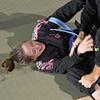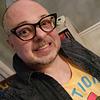Take a photo of a barcode or cover
68 reviews for:
Bunk: The Rise of Hoaxes, Humbug, Plagiarists, Phonies, Post-Facts, and Fake News
Kevin Young
68 reviews for:
Bunk: The Rise of Hoaxes, Humbug, Plagiarists, Phonies, Post-Facts, and Fake News
Kevin Young
informative
medium-paced
I always love a great book about hoaxes, cults and pseudoscience. This one puts race front and center in a way the white authors I've read fail to do. The false memoir is a particularly interesting bit and doubles are mentioned. If you've read Naomi Klein's Doppelganger, that may resonate. While it doesn't focus on Trump, that is the inescapable time and context in which the book was written. Through a history of spirit photography, hoaxes, plagiarism, and fake memoirs we're asked to think of truth as a muscle that has atrophied. We can reclaim it if we choose. I hope we collectively choose that soon.
I'll note the last part of the quote. It feels like it's talking about lots of bad things - oppressive authoritarian religions, Zionism, American militarism/imperialism.
"Hoaxers wound the world and then say, see how the world is wounded? the whole world is fake and then say they are all that's real. Such behavior they share with cult leaders, whether Jim Jones and his People's Temple or the millennial Heaven's Gate followers. It's no accident that Morgan's Real People are apocalyptic cultists: whenever such a group insists its reality is the only one, that reality inevitably becomes more and more extreme, ending the only way it can, in extinction. The result is not only deadly but deadening."
I'll note the last part of the quote. It feels like it's talking about lots of bad things - oppressive authoritarian religions, Zionism, American militarism/imperialism.
"Hoaxers wound the world and then say, see how the world is wounded? the whole world is fake and then say they are all that's real. Such behavior they share with cult leaders, whether Jim Jones and his People's Temple or the millennial Heaven's Gate followers. It's no accident that Morgan's Real People are apocalyptic cultists: whenever such a group insists its reality is the only one, that reality inevitably becomes more and more extreme, ending the only way it can, in extinction. The result is not only deadly but deadening."
I tried - this is good, it's just DENSE. I couldn't give it what it needed.
informative
reflective
medium-paced
Kevin Young's Bunk isn't, itself, "bunk," but there is a whole lot of posing and pretense in this long, ruminative, and ultimately unsatisfying study of "hoaxes, humbug, plagiarism, phonies, post-facts, and fake news." Young is a poet, and so very often he gets caught away in waxing clever or lyrical about some act of fakery that he is recounting, rather than carefully explaining and critiquing it. The first several chapters work pretty well; for a while, it really seemed as though Young was developing an actual critical thesis, as he used P.T. Barnum and a plethora of 19th-century and early 20th-century examples of side-show attractions and carnivalesque nonsense to distinguish (as Barnum himself did) between "humbug" and outright lies, as well as tie the often-denied-yet-still-constant American affection for (and expectation of) fakes, outrage, and spin to our complicated (and just as frequently denied) racial and sexual suspicions and curiosities. But in order for this critical work to hold, Young would need to be stylistically consistent and thorough in his treatment of ridiculous tabloid stories, pretend mediums, and imposters of numerous sorts, and he wasn't, especially as the book went on. Frequently he'd jump from one con man to another act of forgery, and there wouldn't even be a minimally required amount of historical information to know who or what, exactly, we were talking about.
In the end, Young's immense amount of research into this topic was obvious (the old playbills, news photographs, and drawings throughout the book are a delight), but while he obviously thought his presentation of it all added up to something, it didn't. Often--especially once he starts looking at literary plagiarists--it seems fairly event that Young is more interested in settling scores than anything else (his statement--for which he acknowledges his debt to Seinfeld--about Laura Albert, who punked much of America's sensationalist, low-brow literary set with her stories as "JT Leroy," is probably the truest thing in the book: "it offends me as a writer"--pg. 214). I learned a lot of trivia from the book, but I would have preferred, instead of the giant info dump, he'd really honed his arguments--or, failing that, he scrapped the huge sprawling mess in favor of some free-form which touch on the topic in a personal way (his chapter on Rachel Dolezal, the white woman who has apparently convinced herself--and long convinced others--that she is black, "Blacker than Thou," is written in this manner, and it's the best chapter in the book).
In the end, Young's immense amount of research into this topic was obvious (the old playbills, news photographs, and drawings throughout the book are a delight), but while he obviously thought his presentation of it all added up to something, it didn't. Often--especially once he starts looking at literary plagiarists--it seems fairly event that Young is more interested in settling scores than anything else (his statement--for which he acknowledges his debt to Seinfeld--about Laura Albert, who punked much of America's sensationalist, low-brow literary set with her stories as "JT Leroy," is probably the truest thing in the book: "it offends me as a writer"--pg. 214). I learned a lot of trivia from the book, but I would have preferred, instead of the giant info dump, he'd really honed his arguments--or, failing that, he scrapped the huge sprawling mess in favor of some free-form which touch on the topic in a personal way (his chapter on Rachel Dolezal, the white woman who has apparently convinced herself--and long convinced others--that she is black, "Blacker than Thou," is written in this manner, and it's the best chapter in the book).
This book was all over the place. It was mostly fascinating, but sometimes bogged down in tiresome detail. The text is hard to pin down — not sure what it wants to be. But nonetheless the most compelling parts carried the book for me.
slow-paced
This book is LONG and this book is DENSE. It is academic enough that I can't believe it's not published by a university press, and it's quite dry, with a few exceptions. It's also - to me, anyway - very confusingly organized. All that being said, the subject matter is something I've never really thought about so it was great learning something new, and that's why 4 stars.
It's hard not be completely dishearten about this time in history after finishing this book. There is no happy ending.
This mostly reads like a series of trivia that never really adds up to anything. Much, much too long and no conclusion. The many, many uses of 'worser' drove me bonkers.
While the writing can be meandering and confusing at first glance, stick with this and dig in. This is one of the more original books I've read in some time.
"You could go so far as to say the hoax is racism's native tongue. They both are things that don't really exist but stay with us despite our disbelief, revealing more than is meant. " started this on audio but had to switch to print as I really didn't care for the narration.
"You could go so far as to say the hoax is racism's native tongue. They both are things that don't really exist but stay with us despite our disbelief, revealing more than is meant. " started this on audio but had to switch to print as I really didn't care for the narration.






